
Budget moves front and center as General Assembly prepares to meet for State of the State Address on Monday
The pace quickened on Capitol Hill last week as lawmakers put the finishing touches on legislative proposals before this Thursday’s bill filing deadline and prepare to receive Governor Bill Lee’s budget proposal on Monday night. Senate committees also heard testimony regarding several important issues before the General Assembly, including Tennessee’s health status and progress being made to ensure mental health parity. In other action, state senators advanced a Right to Work Constitutional Amendment resolution, legislation to help Middle College Scholarship recipients and first-time homeowners, and a proposal to officially recognize Tennessee’s long-held nickname as the Volunteer State.
The General Assembly will meet in a joint session in the Tennessee State Capitol on Monday evening to hear Governor Bill Lee’s second State of the State address, where he will unveil his budget proposal for the 2020-2021 fiscal year. Passage of a conservative balanced budget that highlights education improvements, job creation, and public safety is a top priority for lawmakers this year and is the only duty prescribed for the General Assembly in the state’s constitution. This year’s budget proposal is aided by the fact that Tennessee’s finances are the healthiest in state history and enjoys the highest ranking of the nation’s top credit rating agencies.
Tennessee is among the five least indebted states in the nation per capita, ranks third for best-funded pension plans and is one of only five states without road debt. The state’s financial status is also boosted by record low unemployment rates, rising educational achievement, robust job growth and a healthy economy.
The joint session will be aired at 6:00 p.m. CST / 7:00 p.m. EST and will be live-streamed on the General Assembly’s website. Senate Finance, Ways and Means Committee members will get down to work studying budget details the following morning with an overview of the governor’s plan scheduled from Department of Finance and Administration Commissioner Stuart McWhorter. The budget will continue to be front and center for the remainder of the 2020 legislative session. Senate committees are set to hear the individual budgets of 60 departments or agencies of state government between February 11 and March 11.
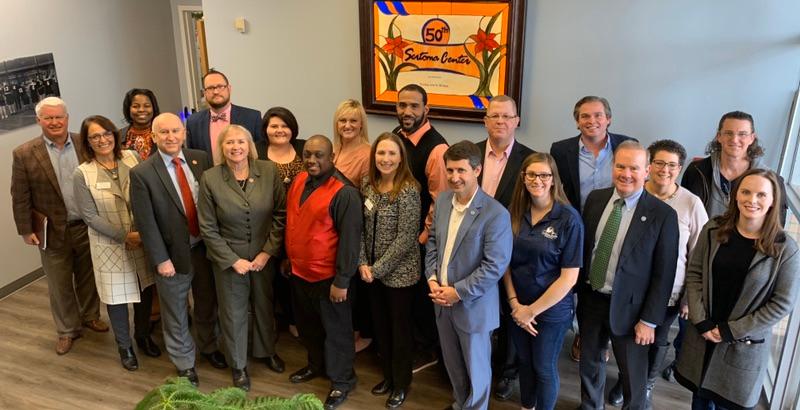
Senator Briggs, Representatives Daniel and Lafferty and I had a great meeting with representatives of the Tennessee Community Organizations (our area disability providers)
Senate State and Local Government Committee approves legislation officially designating Tennessee as the Volunteer State
The Senate State and Local Government Committee has approved Senate Bill 1552, which I am the sponsor, that officially designates Tennessee as the “Volunteer State” to honor the state’s heritage and inspire future generations to answer the call to service. While Tennessee has commonly been referred to by this nickname since as early as 1812, it is not recognized in state law.
The Volunteer State moniker dates back to the War of 1812 because of the prominent role played by volunteer soldiers from Tennessee. It also refers to the state’s response to President Polk’s call for 2,600 volunteers at the beginning of the Mexican-American War, which resulted in 30,000 volunteering from Tennessee alone.
There have been several state mottos which have dissipated. The state was nicknamed ‘the mother of Southwestern statesmen’ because Tennessee furnished the U.S. with three presidents and a number of other leaders who served with distinction in high government office. It was also called the ‘big bend’ state, referring to the Indian name for the Tennessee River. In addition, Tennessee was called the ‘hog and hominy’ state because of the abundance of corn and pork between 1830 and 1840.
The bill now goes to the Senate floor for final consideration. It is also pending final action in the House of Representatives.
Transportation & Safety Committee Updated on the IMPROVE Act
The Tennessee Department of Transportation (TDOT) updated the Senate Transportation Committee (which I Chair) on the status of projects funded under the Improving Manufacturing, Public Roads and Opportunities for a Vibrant Economy (IMPROVE) Act of 2017. Tennessee’s conservative process of funding its highway program is often referred to as a “pay as you go” program. The state only spends the funds on transportation that are available through its dedicated revenues, the highway user taxes and fees, and federal funding. The 2017 law boosted funds available to repair Tennessee’s roads and bridges.
There are 962 specific projects located in all of Tennessee’s 95 counties which are slated for improvements under the act. Of those projects, 333 are in the engineering phase, 62 are in right of way acquisition, 71 are under construction, and 61 have been completed. TDOT Chief Engineer Paul Degges says the department is focused on making sure that revenue collected from the IMPROVE Act goes towards funding projects throughout the whole state, not just the large cities.
The list of IMPROVE Act projects includes the replacement of 525 bridges on local roads in which 20 were closed to traffic, 181 were weight posted such that a fire truck could not pass over them, and 161 where school buses were not permitted. Currently, 111 of these bridges are in the design phase, three are in right of way acquisition, 42 are under construction and 56 are complete. TDOT is also resurfacing and repairing roads in Tennessee’s state parks using IMPROVE Act funds. Details of the projects are listed on TDOT’s website where individuals can track improvements.
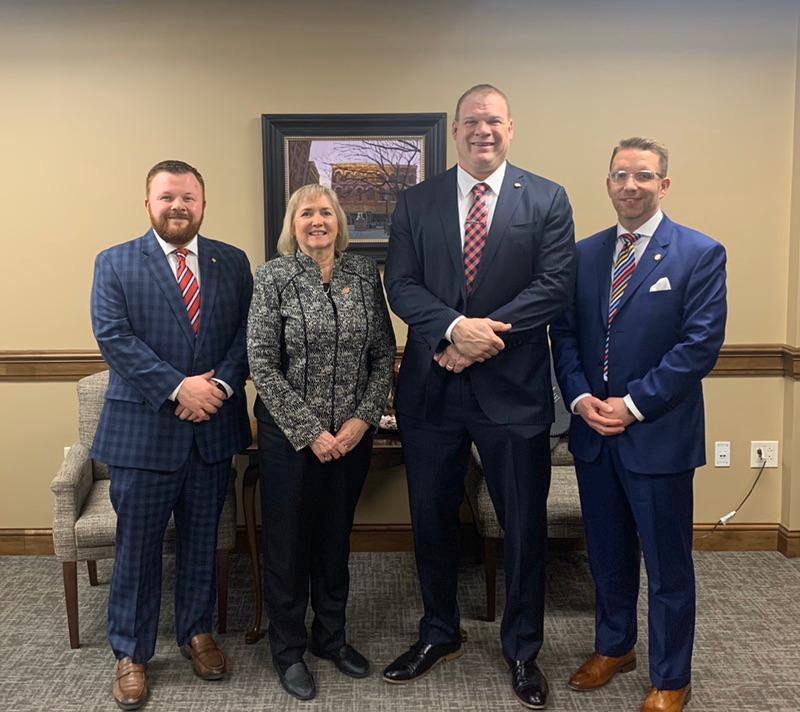
Mayor Glenn Jacobs, Brian Hair and Chris Caldwell stopped by for a visit and to discuss Knox County priorities
In other news…
Joint Government Operations Committee adopt rules for state’s Safe At Home Address Confidentiality Program — The Joint Government Operations Committee voted to adopt permanent rules governing the state’s Safe at Home Address Confidentiality Program. The program, which is the result of legislation passed in 2018, helps victims of domestic abuse, stalking, human trafficking, or any sexual offense by protecting the confidentiality of their address. The purpose is to protect the victims’ information allowing them to escape their abusers and start a new life.
Once a program participant has been approved to participate, they are provided with a ‘substitute’ address. The participant can then use the ‘substitute’ address as their official mailing address for all state and local government purposes and for their children, including public school or public benefits enrollment, subject only to a few limited exceptions. By doing so, the participant’s confidential address will not appear in public records relating to either themselves or their children, including public school or public benefits enrollment. By doing so, the participant’s confidential address will not appear in public records relating to either themselves or their children.
The program is administered by the Secretary of States’s office at no cost to the participants. Approximately 100 participants have signed up for the program thus far.
Senate Health and Welfare Committee hears update on state’s overall health — Dr. Randy Wykoff, Dean of the East Tennessee State University’s College of Public Health, spoke to the Senate Health and Welfare Committee (on which I serve) last week regarding the status of Tennessee’s overall health. Wykoff pointed to the need to work on economic development in the state’s poorest counties as a key factor in improving Tennessee’s overall health. Wykoff linked economic development and education attainment to poor health outcomes among Tennesseans. Governor Lee and the General Assembly are working to combat the problem with a concentrated focus on improving opportunities for the state’s distressed counties. This includes establishing the Center for Rural Health Research at East Tennessee State University. The center is focusing on areas such as the opioid epidemic, adverse childhood experiences, communicable and chronic disease, tobacco use, obesity, rurality and poverty, and limited resource healthcare settings.
Wykoff said unhealthy choices are major contributing factor on health outcomes in Tennessee. “Changing behavior is one of the major things we have to change in our state,” he said. The state ranks 46th in smoking, 45th in diabetes and 47th in physical inactivity. On the positive side, the state ranked 2nd in the nation in childhood immunizations, 3rd in high school graduation rates, 8th in excessive drinking, and 16th for infectious diseases. The state ranks 38th in drug deaths.
Veterans’ higher education programs see success — Tennessee Higher Education Commission (THEC) Executive Director Mike Krause reported to the Senate Education Committee that Tennessee is one of two states in the country with a veteran program designed to bridge the gap between military training and higher education credits. The ServiceMember Opportunity Portal (SOP) is a system where service members can put in the year they served, military branch, rank, and public institution they plan to attend, and it will tell them the classes in which they have earned credit. He says that he would like to see Tennessee become a destination for veterans to settle after their time in the U.S. Armed Forces is completed.
Capitol lighted to raise awareness of slavery and human trafficking – Tennessee’s Capitol Building was lit in blue from dusk to dawn recently to raise awareness about slavery and human trafficking prevention in Tennessee. The Tennessee Bureau of Investigation has reported that human trafficking is the second-fastest growing criminal industry, just behind drug trafficking.
State legislators have approved a series of bills over the past eight years addressing the problem after a 2011 Tennessee Bureau of Investigation (TBI) report showed 73 of the state’s 95 counties have reported the crime within their borders. These legislative efforts earned Tennessee Shared Hope International’s highest ranking in the nation for fighting human trafficking.
In the 2019 fiscal year, the Office of Criminal Justice Programs (OCJP) under the State Department of Finance and Administration provided more than $760,000 to five human trafficking victim service agencies. OCJP funding helped provide services and support to 279 victims of human trafficking for crisis intervention, mental health assistance and advocacy in criminal justice proceedings.
Revenues exceed budget estimates for December – Tennessee’s economy was strong in the month of December resulting in revenue collections that exceeded budget estimates. State revenue collections for the final month of 2019 were $55.3 million higher than the budgeted estimate and 4.87 percent more than December 2018 due to strong sales and corporate tax receipts. Year-to-date revenues for the first five months of the 2019-2020 fiscal year were $351.1 million more than the budgeted estimate. The estimates for 2019-2020 are based on the State Funding Board’s consensus recommendation of November 26, 2018 and adopted by the first session of the 111th General Assembly in April 2019. Also incorporated in the estimates are any changes in revenue enacted during the 2019 session of the General Assembly. These estimates are available on the state’s website at https://www.tn.gov/content/tn/finance/fa/fa-budget-information/fa-budget-rev.html.
TN Department of Education reports show progress in school health —The Tennessee Department of Education (DOE) released four annual reports to lawmakers regarding implementation of best practices in schools to improve student and staff physical and mental well-being. One of the ways they are doing this is through their coordinated school health program which has shown success in the reduction of the number of students with overweight body mass index (BMI). The DOE also reports that the 2018-2019 school year showed a decrease in the number of confirmed bullying cases for the first time in three years.
Tennessee Higher Education Commission makes campus safety a top priority—During a Senate Education Committee meeting Tennessee Higher Education Commission Executive Director Mike Krause told members the commission is taking a new approach to preparing for potential threats to college campuses. Recently strides have been made to train campus security, surrounding police departments, hospitals and other emergency personal for the worst scenarios. In December, a Tactical Emergency Casualty Care (TECC) training was conducted at Vanderbilt University allowing all departments to train and learn how to work together in a mass casualty situation. Lawmakers will discuss other ways to enhance campus security in the coming months.
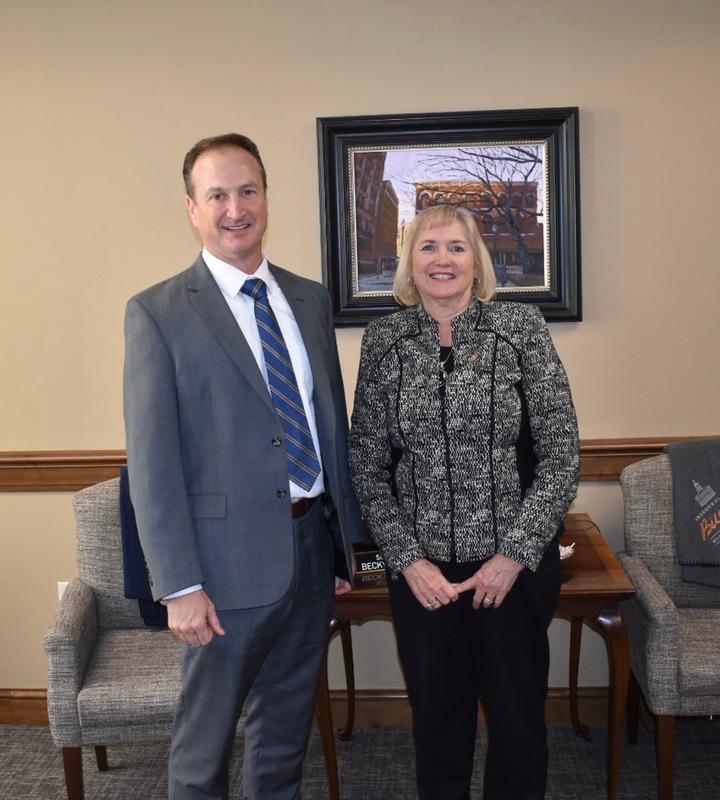
Patrick Wilson, President of the Knoxville Airport Authority, stopped by for a visit to discuss issues affecting the airport.
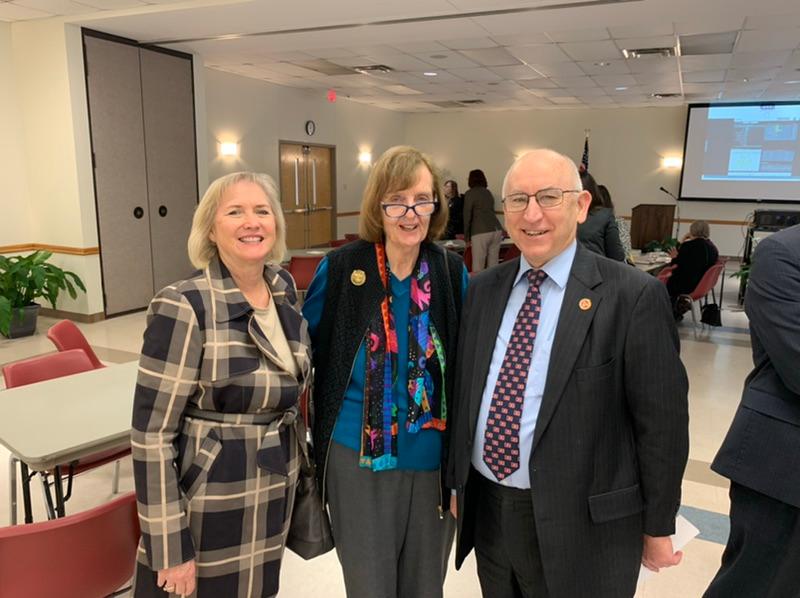
We received an interesting briefing from 211-the social services hotline. Great seeing Barbara Kelly, Community Action Committee Executive Director

The UT Naifeh Center visited the Capitol

Thanks for the great work that the Remote Area Medical does in providing free, quality healthcare to those in need. I stopped by their clinic in Knoxville along with Senator Briggs and former Congressman Jimmy Duncan
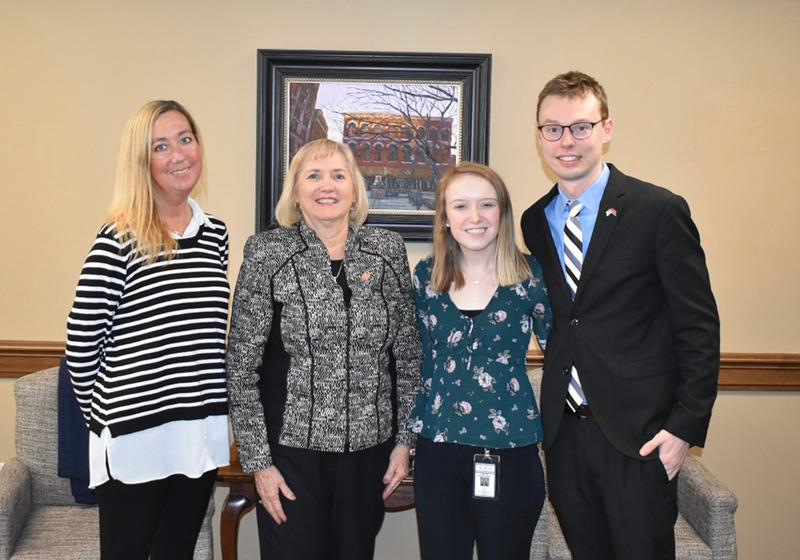
I have an amazing staff supporting me in Nashville and helping with constituent services. It includes Debbie Gazzaway (Research Analyst), Kaylee Wilson (Intern) and Austin Deal (Administrative Assistant)
For information on State Senators including phone numbers and email addresses, click Tennessee State Senators.
For House members, click Tennessee House Members
For all other information on the General Assembly including legislation, schedules and videos, click Tennessee General Assembly
As always thank you for continued support!
Sincerely,
Becky Massey
District 6 Senator
615-741-1648.
